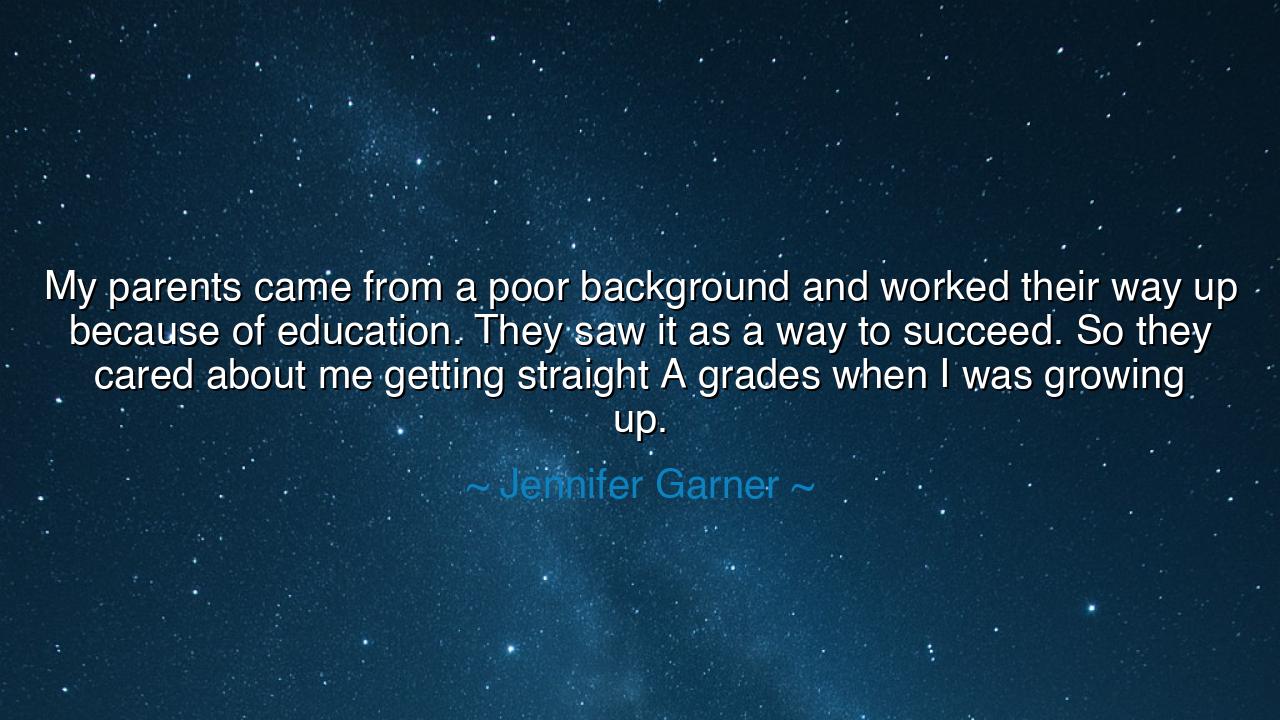
My parents came from a poor background and worked their way up
My parents came from a poor background and worked their way up because of education. They saw it as a way to succeed. So they cared about me getting straight A grades when I was growing up.






Hear, O children of perseverance, the words of Jennifer Garner, who spoke of the roots that nourished her: “My parents came from a poor background and worked their way up because of education. They saw it as a way to succeed. So they cared about me getting straight A grades when I was growing up.” In this remembrance lies not only the story of a family, but the eternal law of human progress: that hardship may be overcome, not by inheritance or chance, but by learning, diligence, and the strength of the mind.
Her parents, born into poverty, refused to let circumstance dictate destiny. They reached upward, and the ladder they climbed was education. For the poor have few weapons, but knowledge is one that cannot be taken away. They saw in study not a pastime, but a key—the key to open doors locked by wealth, the key to a better life for themselves and for their children. Having ascended, they taught their daughter that excellence was not optional, but necessary. Thus they impressed upon her the value of straight A grades, not as vanity, but as preparation for life.
History abounds with such testimonies. Consider Abraham Lincoln, born in a log cabin, with little but hunger and will. Books were scarce, yet he devoured whatever words he found by firelight. His education, self-taught and hard-earned, became the foundation of his rise from rail-splitter to president. His story, like Garner’s parents, teaches that though poverty may bind the hands, it cannot bind the mind that is determined to learn.
The wisdom of this quote lies in the understanding that success is rarely given—it is built, brick by brick, through the discipline of learning and the sacrifice of effort. For those who come from wealth, doors may open by inheritance; but for those who come from poverty, the door must be forced open by the key of education. This is why parents who have endured hardship often press their children toward excellence. They know what it costs to rise, and they know that knowledge is the only inheritance that cannot be lost.
Yet let us not mistake the meaning: the pursuit of grades is not the ultimate end, but the symbol of discipline, perseverance, and mastery. Straight A’s, in Garner’s story, represent the seriousness with which her parents approached learning. They are a reflection of values, not vanity. The true aim is not letters on paper, but the building of a character capable of carrying burdens, meeting challenges, and shaping a better destiny.
The lesson, O listener, is clear: honor education as the tool of transformation. If you are born into hardship, let knowledge be your weapon. If you are blessed with opportunity, do not squander it—use it as a bridge for yourself and for others. Parents, let your children know the power of learning; children, respect the sacrifices of your parents and pursue study with gratitude.
Practical action lies before you: seek wisdom in books, in mentors, in experience. Do not despise the struggle of study, for it is the soil from which your future grows. Support schools, uplift teachers, and extend the gift of education to those still bound by poverty. And above all, remember that grades are not merely numbers—they are the reflection of diligence, the armor of the weak against injustice, the pathway to strength.
Thus remember Jennifer Garner’s words: that her parents rose from poverty by education, and so demanded of her the same excellence. Let this truth pass down to every generation: though wealth may fail and power may fade, knowledge remains, lifting those who embrace it from the shadows into the light of success.






AAdministratorAdministrator
Welcome, honored guests. Please leave a comment, we will respond soon